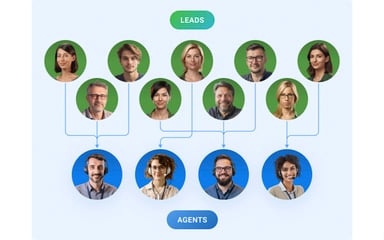Strategies and Best Practices for AI Lead Conversion
The rapid advancements in Artificial Intelligence (AI) have led to its increasing adoption in various industries, including digital marketing. AI has proven to be a game-changer in optimizing lead conversion. It can streamline processes, automate tasks, and provide data-driven insights. This article delves into the best practices for using AI to optimize lead conversion key strategies for achieving the best results.
Understanding AI's Role in Lead Conversion
AI plays a crucial role in enhancing lead conversion by adding intelligence and automation in these areas:
AI Lead Generation
Intelligent Lead Scoring
Automation of Routine Tasks
Enhanced Analytics and Insights
Key Strategies for Using AI in Lead Conversion
Best Practices
AI Lead Generation
AI-powered lead generation utilizes various technologies, including machine learning, natural language processing, and predictive analytics, to identify and engage leads.
AI systems can understand and learn from unstructured data like posts, comments, reviews, or likes, identifying user preferences and needs.
This data collection is used to create and optimize personalized marketing content. By analyzing a lead's past behavioral data, content and messages are tailored to engage and resonate with each individual lead.
For instance, customers who often buy organic products might receive content related to eco-friendly initiatives or new organic product launches. Meanwhile, customers who browse tech gadgets frequently might get updates about the latest technological innovations. These targeted messages resonate strongly with recipients as they align with their interests and needs, leading to higher engagement.
This personalization can significantly increase the likelihood of a lead engaging with your content and ultimately converting.
AI also automates many repetitive tasks associated with lead generation, such as data entry and initial outreach. This makes the process more efficient and minimizes the chance of human error, improving the overall quality of your leads.
Enhance Lead Conversion with AI-Optimized Landing Pages
While AI streamlines lead scoring and automates outreach, its impact extends to the very first touchpoint: your landing pages. A recent guide from ClickPoint Software demonstrates how to leverage AI prompts to craft high-converting landing pages tailored for lead generation. ClickPoint Software+4blog.clickpointsoftware.com+4ClickPoint Software+4
This resource outlines how to:
-
Generate benefit-focused headlines that address customer pain points.
-
Incorporate compelling value propositions and trust signals like testimonials and certifications.
-
Design mobile-optimized layouts with clear calls to action and simplified forms.
-
Ensure compliance with regulations such as TCPA, CAN-SPAM, and GDPR.
By integrating these AI-driven strategies, marketers can create landing pages that not only attract but also convert visitors more effectively. For a comprehensive walkthrough and practical examples, refer to the full article: How to Use AI Prompts to Build High-Converting Landing Pages.
Intelligent Lead Scoring
Intelligent lead scoring, enabled by AI algorithms, analyzes large volumes of data to find patterns and behaviors. These patterns indicate the likelihood of lead conversion, identifying and prioritizing the highest quality leads.
The AI considers many factors, such as demographic data, online behavior, social media interactions, past purchases, etc.
The AI then applies these data points to a lead-scoring model to assign points to each lead. The score indicates how likely the lead is to become a customer. Higher scores are assigned to leads with characteristics similar to past customers, indicating they are more likely to convert. Lower scores are given to leads that don't match the profile of a likely customer.
Through this process, AI lead scoring provides an objective and quantitative method for prioritizing leads. It allows sales teams to focus on the most promising leads, increasing efficiency and improving conversion rates. As more data becomes available, the AI model continues to learn and refine its scoring criteria, increasing its accuracy.
Automation of Routine Tasks
AI-powered automation is a game-changer in managing routine tasks. AI's ability to absorb repetitive tasks such as follow-up emails and scheduling sales calls saves valuable time. It also creates more consistent communication, which is crucial in delivering a seamless customer experience.
AI automates follow-up emails based on a prospect's behavior. AI systems can automate targeted product emails or offers if a potential customer has multiple product page visits without a purchase. This ensures that every customer touchpoint is timely and personalized, increasing the chances of conversion.
Similarly, sales call scheduling can be automated using AI. AI can determine sales rep and lead availability and schedule the call. It can also consider factors such as the lead's preferred contact time, leading to a more customer-centric approach.
Moreover, AI can learn from historical data to optimize its automation strategies. It can analyze which types of emails lead to the highest engagement and adapt email marketing campaigns. It can use data analysis to create higher-converting calls to action. By learning and adapting, AI ensures that the automation of routine tasks is efficient and improves over time.
Businesses can focus their resources on more strategic activities by automating routine tasks with AI. This makes AI an invaluable tool for increasing productivity.
Enhanced Analytics and Insights
AI-powered analytics tools transform how we understand and improve marketing campaign performance. They present marketers with invaluable insights that inform decision-making and strategy optimization for better lead conversion. By analyzing complex data from various sources, these tools can discern patterns and trends that might be missed by human analysis. This improved visibility allows marketers to tailor campaigns more effectively.
These tools can help to identify potential gaps in the sales funnel. For example, AI can show where leads get stuck in the sales cycle due to unclear messaging or poor content. It can also predict future customer behavior based on historical data, allowing marketers to address potential issues proactively.
Such insights equip businesses with the knowledge to refine their strategies, enhance the customer journey, and ultimately maximize conversion rates.
Key Strategies for Using AI in Lead Conversion
To effectively use AI in optimizing lead conversion, consider implementing the following strategies:
Adopt AI-Powered Lead Scoring Systems
Integrate AI-driven lead-scoring solutions into your marketing strategy to prioritize high-quality leads. This enables your sales team to focus on the highest value prospects, resulting in more efficient use of resources.
Leverage AI for Personalized Content
Use AI to create tailored content and marketing messages based on individual preferences and browsing behavior. Personalization helps establish a connection with your target audience and increases the chances of conversion.
Automate Routine Tasks with AI
Streamline the lead conversion process by automating repetitive tasks using AI-driven tools. Automation not only saves time but also ensures consistent communication with your leads, fostering trust and improving the overall customer experience.
Utilize AI-Driven Analytics Tools
Make data-driven decisions by leveraging AI-powered analytics and reporting tools. These insights will help you identify areas for improvement, optimize your marketing strategies, and ultimately increase conversion rates.
Test and Optimize AI Solutions
Regularly monitor the performance of your AI-powered tools and adjust them as needed. Regularly assess the impact of AI on your lead conversion efforts and optimize your strategies accordingly.
Best Practices for Implementing AI in Lead Conversion
To maximize the benefits of AI in lead conversion, follow these best practices:
Choose the Right AI Tools
Select AI-powered solutions that align with your business goals and objectives. Consider your marketing and sales team's specific needs and opt for tools that offer the required features and functionalities.
Integrate AI with Existing Systems
Ensure seamless integration of AI-driven tools with your existing marketing and sales platforms. This integration streamlines workflows, enhances collaboration between teams, and provides a unified view of customer data.
Establish a Data-Driven Culture
Encourage a data-driven mindset within your organization by providing team members with access to AI-powered analytics and insights. Empower them to make informed decisions and optimize their marketing strategies for better lead conversion.

Train Your Team
Educate your marketing and sales teams on the benefits and functionalities of AI-driven solutions. Provide them with the necessary training and resources to effectively understand and utilize these tools to simplify and improve their process.
Monitor AI Performance and Adjust Strategies
Regularly track your AI-powered tools' performance to ensure they deliver the desired results.
A/B Test AI-Driven Campaigns
Regularly test different variations of your AI-powered marketing campaigns to identify the most effective strategies. A/B testing helps you refine your approach and improve overall conversion rates.
Focus on User Experience
Ensure your website and landing pages are user-friendly, mobile-responsive, and fast-loading. AI-powered chatbots and personalization tools can help enhance the user experience, significantly impacting lead conversion rates.
Challenges and Considerations in Implementing AI for Lead Conversion
Despite its numerous benefits, implementing AI-driven solutions for lead conversion comes with its own set of challenges and considerations:
Data Quality and Privacy
AI algorithms rely on large volumes of data to generate accurate insights and predictions. Ensuring data quality and privacy is critical to the success of AI-driven lead conversion strategies. Businesses should adhere to data privacy regulations and implement best practices for data management.
Integration with Existing Systems
Integrating AI-powered solutions with existing marketing and sales platforms can be complex. It is crucial to invest time and resources in seamless integration to maximize the benefits of AI-driven lead conversion.
Cost and ROI
Implementing AI-driven solutions can be costly, and the return on investment (ROI) might not be immediately apparent. Businesses should carefully assess their budget and prioritize AI implementations that offer the highest potential ROI.
Bias in AI Algorithms
AI algorithms can sometimes reflect human biases present in the data they analyze. This can lead to suboptimal lead conversion strategies. To overcome this issue, businesses should invest in the development of unbiased AI models and regular audits of AI-driven tools.
Read more about AI marketing optimization including schema markup, SEO, LLMO, GEO, and SERP







